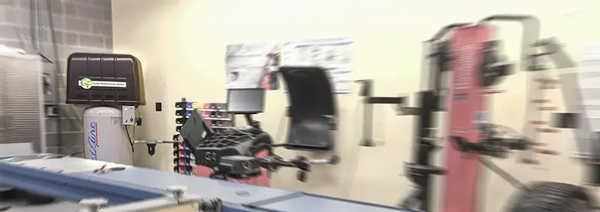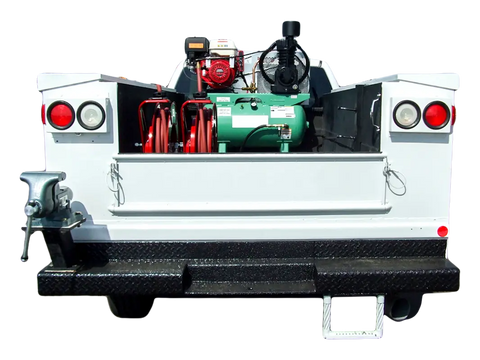What Type of Air Compressor Should I Buy for a Tire Repair or Automotive Garage?
Posted by Jimmy Hill on
Email: jimmy.hill@alltiresupply.com

How will you use it?
When setting up a new tire repair shop (View) or seeking to replace a compressor in an existing shop, it becomes quickly apparent that there are a lot of types of compressors to choose from. You should first think about what your intended use for the compressor is. Do you plan to put in a garage setting where it will be used frequently for multiple applications, such as tire inflation and driving pneumatic equipment, or will it be used on a mobile service truck? If you plan to use a compressor in a shop, you would in most cases, want a unit that has a tank capacity of at least 60 gallons. If you plan to put it on a service truck, you would want a smaller unit with a gas powered motor.

How a compressor works.
A compressor sucks in air circulating in the room, and using the pump, squeezes it into a smaller volume and stores it in a steel tank under pressure. As air is released to drive air tools or inflate tires and the pressure in the tank goes down, the pump is reactivated by a pressure sensor and switch, then it runs until it rebuilds pressure in the tank to a preset level. It is important to note that the air around us has water(humidity) content as well as dirt and other impurities. Therefore, running an air compressor will result in water accumulation and debris, in the steel tank as well as into the hoses and tools which can cause damage. This underscores the need for placing a filter on the compressor outlet coupling to trap water and debris, as well as regularly draining any water which accumulates in the steel tank. Recognizing that some moisture will get through the hose, the pneumatic tools should be cleaned and lubricated on a regular basis.
ATS Staff Recommendations.
 |
For Most Light-Medium Duty Mobile Service Trucks (View) |
 |
For Heavy Duty Industrial Service Trucks and Mobile Applications (View) |
 |
For Small - Medium Sized Garages (View) |
 |
For Large Garages (View) |
More Details.
Small to medium-sized shops will need a unit wire on a separate 240 volt circuit. We recommend a two stage compressor, which means it has two pistons and deliver nearly continuous flow of compressed air. A single stage compressor with only one piston is better for light use around the home. The horsepower of the motor driving the pump is usually in the range of 5 to 15 HP, but more importantly, one needs to look at the CFM(cubic feet per minute) rating of the compressor and make sure that it supplies enough flow for all of tools and applications you expect to use it for. If you add up all the CFM ratings of your air tools, plus add a margin safety, that will give you an estimate of what to look for. A CFM of 20-25 for a small to medium-sized shop should be adequate. Keep in mind, once you pick a compressor, you will also need fittings, a filter to put on the outlet coupler, hose(s), and Teflon tape.
Share this post
- 1 comment
- Tags: Air Compressor, Auto Shop, Roadside service, Tech Tips, Tire Repair, Tire Repair Shop, Tire Service, Tire Shops
1 comment
Hi!
Replacing your truck tires is one of the regular expenses to be expected when operating a commercial truck. Irregular wear, however, can force you to replace truck tires early and waste money.